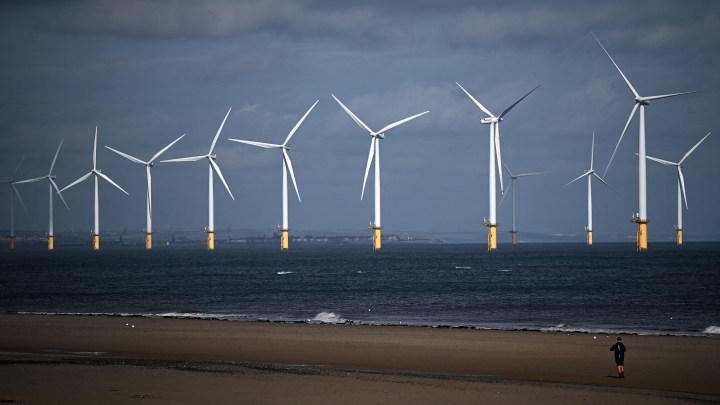
Should the U.K. government nationalize the wind?

Britain’s opposition Labour Party is enjoying a 36-point opinion poll lead over the ruling Conservatives. This follows the recent debacle over the Conservatives’ fiscal policies, which tanked the pound and rattled international markets. Labour has now unveiled its own plan to revive Britain’s economic fortunes.
The centerpiece is a proposal for a new clean energy company to invest in wind, solar, tidal and other renewable sources of power. The most eye-catching feature of the plan incorporates an old economic model that many conservative commentators regarded as defunct: public ownership. Under the plan, a company to be called “Great British Energy” would be set up with taxpayers’ money and owned by the government.
Mathew Lawrence, director of the Common Wealth think tank, which promotes what it calls “democratic ownership,” welcomed the Labour Party’s proposal and said he didn’t believe it was the least bit controversial.
“The U.K. already has very extensive public ownership of renewable generating capacity, it’s just that it’s not owned by the British government,” he said.
Take offshore wind power, for example — the single largest source of renewable energy in the U.K., supplying around 14% of total electricity needs. Foreign governments, Lawrence said, own around half the U.K.’s offshore wind-generating output, while the British government’s stake is paltry.
“The U.K. government owns only .03% of offshore wind capacity in its territorial waters,“ he said. “Compare that with the Danish government’s share of 20.4% and Norway’s 9.2%. Even the Malaysian government and the City of Munich have a bigger stake in U.K. offshore wind than the British government.”
Lawrence believes that the Labour Party’s proposed publicly-owned renewables company could both reduce household fuel bills for the British people and invigorate the quest for more clean abundant energy.
Mika Minio-Paluello, an industry analyst with the trade union umbrella group (the TUC) also supports Labour’s plan as a way of keeping more of the benefits of the renewable energy revolution in the U.K.
“Continuing to sell off our wind, our sun, our natural resources to largely foreign, publicly-owned and sometimes privately-owned companies so that the profits go to people in other countries isn’t a great strategy for economic success,” Minio-Paluello said.
But neither is British public ownership, according to critics of the Great British Energy proposal. Older Brits should not forget the turmoil of the 1970s, per Andrew Hilton, the founder of the Centre for the Study of Financial Innovation. The massive wave of strikes — many of them in the nationalized industries — swept Margaret Thatcher to power and inspired her to privatize a wide range of state-owned enterprises, including electricity and gas companies.
“Anybody over the age of 50 ought to remember the shambles that Margaret Thatcher inherited when she took over and she found the public sector in a terrible mess,” Hilton said.
Public-sector unions proved much stronger and more militant than their private sector counterparts, and that led to a lot of labor unrest, Hilton claimed. And without the discipline of needing to make a profit, he said that the U.K.’s nationalized industries were prone to waste and inefficiency, and also subject to under-investment when government budgets were under pressure.
But if the Danes, the Norwegians, the French and others can do it, are we to believe that the Brits are incapable of running an efficient state-owned energy company today?
“Unfortunately, I would have to say we probably are incapable of doing it on the basis of our track record,” Hilton said.
Another public ownership skeptic is Andy Mayer, energy analyst with the free market Institute of Economic Affairs. He believes that with the protective cushion of state funding, Great British Energy would crowd out its rivals and morph into a monster.
“A giant, too-big-to-fail state corporation producing very expensive energy, no market competition, no pressure on prices for efficiency. And I believe we’d get potential insecurity of supply, as well,” Mayer said.
But that remains a minority view: 66% of the Brits would like to see the whole energy industry re-nationalized, according to a recent poll.
In spite of the political and economic crisis that has engulfed the British government recently, it may not face an election for 2 years, Labour may not get the chance to implement its plan any time soon, and public ownership may remain on the back burner. But there’s little doubt which way the wind is blowing.
There’s a lot happening in the world. Through it all, Marketplace is here for you.
You rely on Marketplace to break down the world’s events and tell you how it affects you in a fact-based, approachable way. We rely on your financial support to keep making that possible.
Your donation today powers the independent journalism that you rely on. For just $5/month, you can help sustain Marketplace so we can keep reporting on the things that matter to you.

















